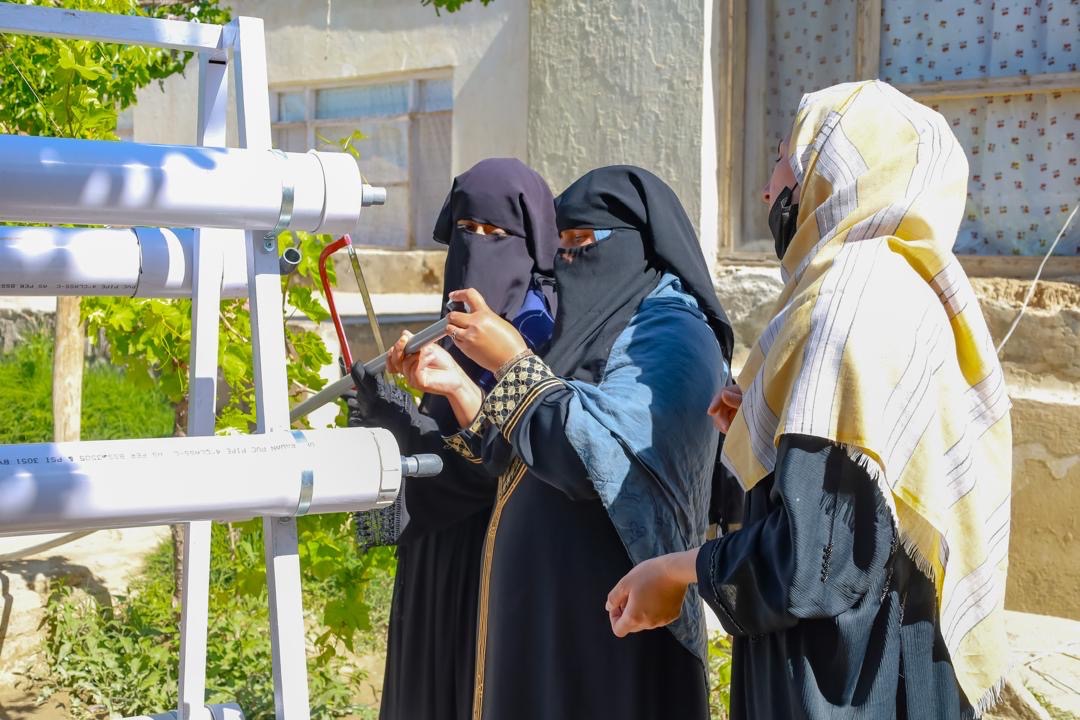Hydroponic gardening for women in Kabul, nurturing hope three years after the Taleban comeback
"Green rooms" is one of the latest initiatives by the "She works for peace" association, founded by social entrepreneur Selene Biffi. One of the projects is a vegetable garden project that allows Afghan women to save water and soil. This is a window of hope in a country plagued by drought and food insecurity.
Kabul (AsiaNews) – The Taliban have ruled Afghanistan for three years. On 15 August 2021, they regained control of the capital Kabul after the United States-led international forces withdrew.
From starting as an armed insurrection, the Taliban are now the country’s de facto authority. Since they took over, the economy has collapsed, while their obscurantist views and restrictive laws have been imposed, especially on women who are denied higher education, work with the public, access to outdoor spaces, and even travelling on their own.
Yet, many Afghan women refuse to bow to the fate imposed on them. Selene Biffi, founder of the “She works for peace” association, which has been supporting women's micro-entrepreneurship in Afghanistan for three years, knows this very well.
With her latest project, called “Green Rooms,” she has managed to implement something that many thought impossible: home hydroponics systems that save up to 90 per cent of water and responds to a double need: food security for families and employment for women.
After the first phase of training involving 35 women, in many cases illiterate or widowed, due to decades of war, 260 people are now involved.
This is an innovative and unique project, thanks to the economic support of the Marcegaglia Onlus Foundation. Another company, also run by women, will join the latter for the sale of fresh vegetables.
“The women who participate learn to build, manage and personally take care of different types of gardens, and the cultivation of vegetables in watery solutions instead of the ground, using local materials at almost zero cost,” explained Biffi, who was a guest at the PIME centre in Milan on May 29.
“Thanks to what they learn and the technical skills they acquire, women contribute to improving the food security of their families and creating local job opportunities.”
Today, almost half of the Afghan population (about 20 million people) survives solely on humanitarian aid.
To make matters worse, the situation is compounded by low literacy, around 22 per cent. About four million women and children suffer from acute malnutrition.
Due to the economic crisis and lack of money, household debts have increased sixfold, and more than 70 per cent of family income is used to buy food.
Hydroponics has proved to be a winning choice in a country that is increasingly affected by annual drought due to climate change. In addition to saving water resources, it yields three times that of traditional agriculture and since it is vertical, it takes up less land.
“The dozens of gardens that the participating women have built from scratch with work and determination, learning the techniques, correct management and maintenance, and of fruit and vegetables,” said Biffi who has been involved in Afghanistan since 2009.
Before "Green rooms", the association "She works for peace" had already set up original projects to allow Afghan women to continue working from home.
One such project is "Abzar", a "tool library" where women can borrow materials and work tools for free (such as household appliances and sewing machines) to develop their businesses.
"Brave bus" is another, touring the poorest neighbourhoods of Kabul, it provides technical assistance, production materials and encouragement to women who work from home.
“Social innovation is crucial because it creates change, bringing culture, dialogue and sustainability,” Selene Biffi explained.
“Only with these can we give hope to a country that, for over 20 years, has seen few results from the projects proposed by the international community.”
22/12/2022 11:31
11/01/2023 17:15
28/01/2023 14:36







.png)










